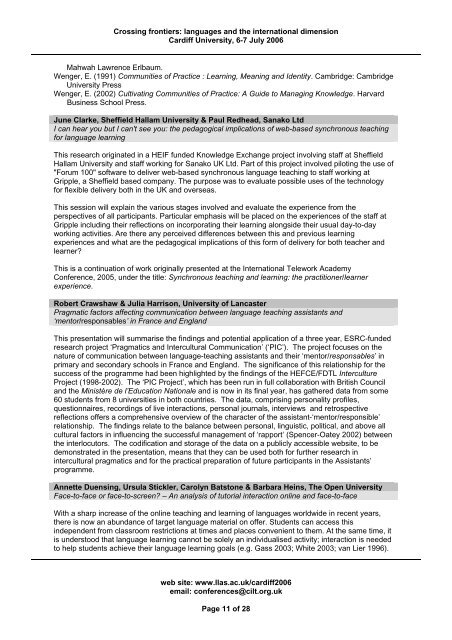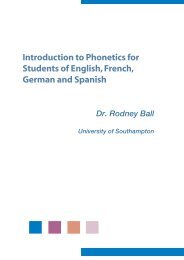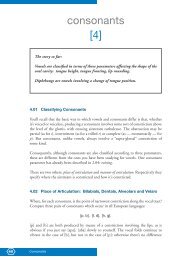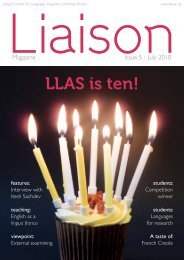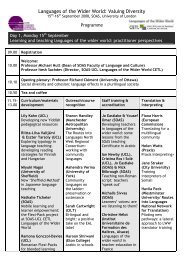Crossing frontiers: Languages and the international dimension
Crossing frontiers: Languages and the international dimension
Crossing frontiers: Languages and the international dimension
You also want an ePaper? Increase the reach of your titles
YUMPU automatically turns print PDFs into web optimized ePapers that Google loves.
<strong>Crossing</strong> <strong>frontiers</strong>: languages <strong>and</strong> <strong>the</strong> <strong>international</strong> <strong>dimension</strong><br />
Cardiff University, 6-7 July 2006<br />
Mahwah Lawrence Erlbaum.<br />
Wenger, E. (1991) Communities of Practice : Learning, Meaning <strong>and</strong> Identity. Cambridge: Cambridge<br />
University Press<br />
Wenger, E. (2002) Cultivating Communities of Practice: A Guide to Managing Knowledge. Harvard<br />
Business School Press.<br />
June Clarke, Sheffield Hallam University & Paul Redhead, Sanako Ltd<br />
I can hear you but I can't see you: <strong>the</strong> pedagogical implications of web-based synchronous teaching<br />
for language learning<br />
This research originated in a HEIF funded Knowledge Exchange project involving staff at Sheffield<br />
Hallam University <strong>and</strong> staff working for Sanako UK Ltd. Part of this project involved piloting <strong>the</strong> use of<br />
"Forum 100" software to deliver web-based synchronous language teaching to staff working at<br />
Gripple, a Sheffield based company. The purpose was to evaluate possible uses of <strong>the</strong> technology<br />
for flexible delivery both in <strong>the</strong> UK <strong>and</strong> overseas.<br />
This session will explain <strong>the</strong> various stages involved <strong>and</strong> evaluate <strong>the</strong> experience from <strong>the</strong><br />
perspectives of all participants. Particular emphasis will be placed on <strong>the</strong> experiences of <strong>the</strong> staff at<br />
Gripple including <strong>the</strong>ir reflections on incorporating <strong>the</strong>ir learning alongside <strong>the</strong>ir usual day-to-day<br />
working activities. Are <strong>the</strong>re any perceived differences between this <strong>and</strong> previous learning<br />
experiences <strong>and</strong> what are <strong>the</strong> pedagogical implications of this form of delivery for both teacher <strong>and</strong><br />
learner?<br />
This is a continuation of work originally presented at <strong>the</strong> International Telework Academy<br />
Conference, 2005, under <strong>the</strong> title: Synchronous teaching <strong>and</strong> learning: <strong>the</strong> practitioner/learner<br />
experience.<br />
Robert Crawshaw & Julia Harrison, University of Lancaster<br />
Pragmatic factors affecting communication between language teaching assistants <strong>and</strong><br />
‘mentor/responsables’ in France <strong>and</strong> Engl<strong>and</strong><br />
This presentation will summarise <strong>the</strong> findings <strong>and</strong> potential application of a three year, ESRC-funded<br />
research project ‘Pragmatics <strong>and</strong> Intercultural Communication’ (‘PIC’). The project focuses on <strong>the</strong><br />
nature of communication between language-teaching assistants <strong>and</strong> <strong>the</strong>ir ‘mentor/responsables’ in<br />
primary <strong>and</strong> secondary schools in France <strong>and</strong> Engl<strong>and</strong>. The significance of this relationship for <strong>the</strong><br />
success of <strong>the</strong> programme had been highlighted by <strong>the</strong> findings of <strong>the</strong> HEFCE/FDTL Interculture<br />
Project (1998-2002). The ‘PIC Project’, which has been run in full collaboration with British Council<br />
<strong>and</strong> <strong>the</strong> Ministère de l’Education Nationale <strong>and</strong> is now in its final year, has ga<strong>the</strong>red data from some<br />
60 students from 8 universities in both countries. The data, comprising personality profiles,<br />
questionnaires, recordings of live interactions, personal journals, interviews <strong>and</strong> retrospective<br />
reflections offers a comprehensive overview of <strong>the</strong> character of <strong>the</strong> assistant-‘mentor/responsible’<br />
relationship. The findings relate to <strong>the</strong> balance between personal, linguistic, political, <strong>and</strong> above all<br />
cultural factors in influencing <strong>the</strong> successful management of ‘rapport’ (Spencer-Oatey 2002) between<br />
<strong>the</strong> interlocutors. The codification <strong>and</strong> storage of <strong>the</strong> data on a publicly accessible website, to be<br />
demonstrated in <strong>the</strong> presentation, means that <strong>the</strong>y can be used both for fur<strong>the</strong>r research in<br />
intercultural pragmatics <strong>and</strong> for <strong>the</strong> practical preparation of future participants in <strong>the</strong> Assistants’<br />
programme.<br />
Annette Duensing, Ursula Stickler, Carolyn Batstone & Barbara Heins, The Open University<br />
Face-to-face or face-to-screen? – An analysis of tutorial interaction online <strong>and</strong> face-to-face<br />
With a sharp increase of <strong>the</strong> online teaching <strong>and</strong> learning of languages worldwide in recent years,<br />
<strong>the</strong>re is now an abundance of target language material on offer. Students can access this<br />
independent from classroom restrictions at times <strong>and</strong> places convenient to <strong>the</strong>m. At <strong>the</strong> same time, it<br />
is understood that language learning cannot be solely an individualised activity; interaction is needed<br />
to help students achieve <strong>the</strong>ir language learning goals (e.g. Gass 2003; White 2003; van Lier 1996).<br />
web site: www.llas.ac.uk/cardiff2006<br />
email: conferences@cilt.org.uk<br />
Page 11 of 28


